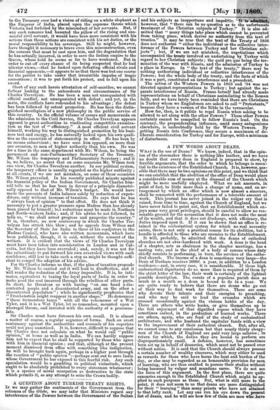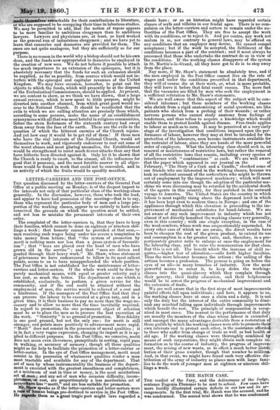A FEW WORDS ABOUT DEANS.
Wirer is the use of Deans ? We know, indeed, that in the opin- ion of the shoemaker there is nothing like leather, and we have no doubt that every dean in England is prepared to show, by
forcible arguments, that the order to which he belongs is essen- tial to the existence of the Established Church. It is, however, pos- sible that there may be two opinions on this point, and we think that
we can establish that the abolition of the office of Dean would place a considerable sum of money at the disposal of the Church which might be more usefully employed. What we ask amounts, in point of fact, to little more than a change of name, and an ar- rangement by which an office which is now almost a sinecure, shall be connected with the performance of a tolerable amount of work. This journal has never joined in the vulgar cry that is raised, from time to time, against the Church of England, but we have never failed to point out, that an Establishment which en- joys some verv great privileges, should be careful to allow no rea- sonable ground for the accusation that it does not make the most of its wealth, and that it does not discharge, with efficiency, the duties imposed upon it. If it can be shown that an office is re- tained in the ecclesiastical system for which no real necessity exists, there is not only a practical reason for its abolition, but a handle is afforded to those who are enemies to the Establishment.
It will, probably, be admitted that the deans of cathedral churches are not over-burdened with work. A dean is the head of a chapter, acts as chairman in the chapter meetings, has a casting vote, and is the chief of a body of canons whose duty chiefly consists in performing, in turn, the services of the cathe- dral church. The income of a dean is sometimes very large—the Dean of Durham receives 3000/. a year, in addition to a London residence—and, in every case, it is considerable. If these high ecclesiastical dignitaries do no more than is required of them by the strict letter of the law, their work is certainly of the lightest possible description. The curate of a populousparish does as much in a month as a dean is bound to do in a year. We are quite ready to believe that there are deans who go out of their way to find work for themselves. There are some who devote their talents and their energies to preaching, and who may be said to lead the crusades which are aroused occasionally against the vicious habits of the day. There are others who write books, or give themselves up to the full enjoyment of that dignified repose which they have sometimes earned, in the production of learned works. There are others, again, who are fond. of the study of ecclesiastical architecture, and who husband the capitular funds with a view to the improvement of their cathedral church. But, after all, we cannot come to any conclusion but that nearly thirty clergy- men of the Church of England are paid very large salaries ; in return for which, the duties they are bound to perform are disproportionately small. A defence, however, has sometimes been set up in behalf of deaneries, which must not be passed over without notice. It is said that the Church should always possess a certain number of wealthy sinecures, which may either be used as rewards for those who have borne the heat and burden of the day, or else may be regarded as an honourable provision for men of learning, who are thus enabled to pursue their studies without being harassed by vulgar and mundane cares. We do not see the force of this argument. In the first place, there are quite eanonries enough in the Established Church which might be ap- plied to such purposes as these. But, what is still more to the point, it does not seem to us that deans are more distinguished for their " learning " than many priests who have not attained to that lofty rank. Let any one run his eye down the present list of deans, and he will see how few of them are men who,bave
inadeareaneelves remarkable for their contributions to literature, or who are supposed to be occupying their time in laborious studies. We may be permitted to add, that the notion of repose appears to be more familiar to ambitious clergymen than to ambitious lawyers. Lawyers and physicians are, at least, as hard worked as the general run of industrious clergymen ; and we have yet to learn that eanonries and deaneries are provided for them. The cases are not quite analogous, but they are sufficiently so for our purpose. There is no reason in the world why a bishop should not be his own dean, and the funds now appropriated to deaneries be employed in the creation of new sees. We do not believe it possible to attach too much importance to an extension of the episcopate, but it is absolutely necessary that the funds for such an extension should be supplied, as far as possible, from sources which would not in- terfere with the episcopal and capitular revenues of the United Kingdom. We may have occasion hereafter, to point out the objects to which the funds, which presently be at the disposal of the Ecclesiastical Commissioners, should be applied. At present, we are content to show, as we think we have shown, that a large annual revenue, which is now spent to little purpose, might be diverted into another channel, from which great good would ac- crue to the National Church. It should be recollected that the evils to which we are calling attention are precisely those which, according to some persons, make the name of an establishment synonymous with all that was most hateful in religious communities, before the stern Reformers of the sixteenth century had swept them away from the face of the earth. These are the evils in the question of which the bitterest enemies of the Church rejoice. And yet how easy it would be to get rid of them! If those men who have the real interests of the National Church, would set themselves to work, and vigorously endeavour to root out some of the worst abuses and most glaring anomalies, the Establishment would be strengthened to resist much fiercer attacks than any that have hitherto been directed against it. Only let it be shown that the Church is ready to exert, to the utmost, all the influences for good that it possesses, and the most forcible answer to all objec- tions would be found in work that could not be concealed, and in an activity of which the fruits would be speedily manifest.



























 Previous page
Previous page